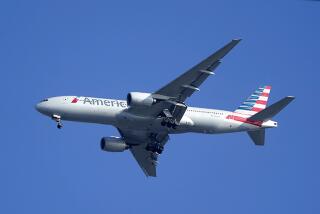Airlines fined $175,000 for stranding passengers on plane
Minneapolis — Federal fines totaling $175,000 were levied Tuesday against the three airlines that stranded dozens of passengers for nearly six hours on a tarmac in Rochester, Minn., last summer. The fines are the first that airlines have received for lengthy tarmac delays.
Continental Airlines and ExpressJet Airlines were given a total civil penalty of $100,000 by the U.S. Department of Transportation for their roles in keeping passengers on board Continental Express Flight 2816 on Aug. 8.
Also, the department assessed a civil penalty of $75,000 against Mesaba Airlines, which provided ground handling for the flight.
Continental also provided a full refund to each passenger and offered additional compensation for their time and discomfort.
A total of 47 passengers were trapped inside the small airplane, complete with crying babies and the aroma of overused toilets.
These “precedent-setting enforcement actions,” as the department described them in a statement, follow a settlement by the carriers over violations alleged by federal authorities.
The fine for Mesaba also reflects the first time a carrier acting as a ground handler for another airline has been punished for failing to properly help passengers during “an unreasonably long tarmac delay,” the statement said.
“I hope that this sends a signal to the rest of the airline industry that we expect airlines to respect the rights of air travelers,” said Transportation Secretary Ray LaHood. “We will also use what we have learned from this investigation to strengthen protections for airline passengers subjected to long tarmac delays.”
The federal investigation found that all three carriers violated the law that prohibits unfair and deceptive practices in air transportation for their respective roles in the incident, in which a Continental Express flight from Houston to Minneapolis/St. Paul operated by ExpressJet was diverted to Rochester due to bad weather.
Before diverting to Rochester, ExpressJet contacted Mesaba for assistance at the airport. Mesaba, the only airline staffing the airport at the time, agreed.
Shortly after arriving in Rochester, the ExpressJet captain asked the Mesaba employee handling the flight whether passengers could enter the terminal. The captain was told that passengers could not enter the terminal because there were no Transportation Security Administration screeners on duty, even though TSA rules would have allowed the passengers to enter the airport as long as they remained in a secure area.
More to Read
Inside the business of entertainment
The Wide Shot brings you news, analysis and insights on everything from streaming wars to production — and what it all means for the future.
You may occasionally receive promotional content from the Los Angeles Times.










